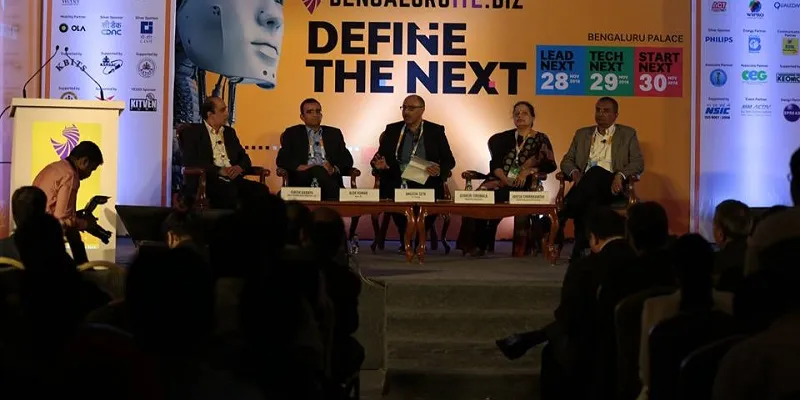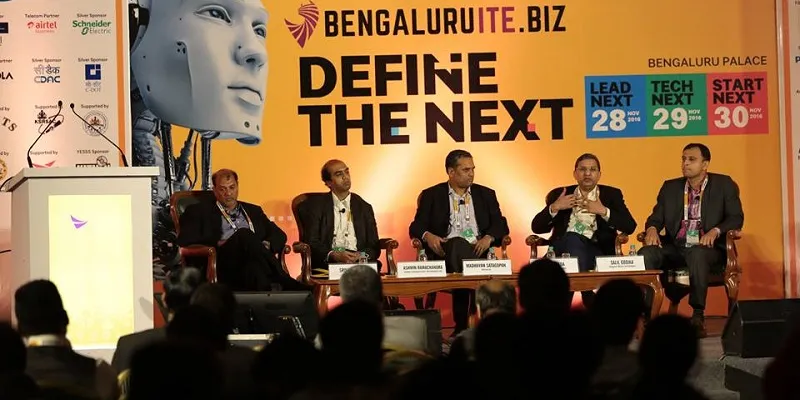India is a young nation making disruption and innovation easier, say industry experts at BengaluruITE.biz
Disruption is uprooting the way we think and behave. Every MNC that is coming into India today is looking at different ways to engage with the world and the ecosystem. What was once unique doesn’t necessarily add value anymore. Madhavan Satagopan, CTO, Altimetrik, said at a panel discussion at Bengaluru ITE.BIZ 2016,
“India today is disrupting for itself and for the world at large. India has the economies of scales and understanding disruption for the masses.”

Ideas drive disruption
Jayesh Chakravarthi, Sr VP and Country Head, IT, Fidelity Business Services India, says,
“Today, innovation is about looking at how your employees internally see your product. At Eureka, Fidelity, we began focusing on ideas to ensure everyone even in a big MNC can work along.”
The way to look at disruption is to talk about it to a developed market. Disruption works when you implement new innovations with what you already have, believes Ashwin Ramachandra, VP and Head, Product Engineering Services, Saken Communication Technologies.
“Big data, machine learning, and AI will transform the way we function and work,” says Ashwin.

A young nation
The panelists believe that India has age on its side, making it easier to get people to take risks and try new things. Since the workforce in India is young, bringing cultural changes and experiments is easier.
Salil Godika, Co-founder and CSO, Happiest Minds Technologies, believes geographical boundaries are shortening. India is the second largest market for them.
Girish Kamath, VP and MD India, Bally Technologies Pvt Ltd, says,
“When you bring ideas and business processes together, there is a great ROI and transformation. This is what makes innovation tick.”
Creating an innovative culture
Jayesh adds that in an industry that doesn't allow people to take risks, you need to start creating an ideation engine and focus on innovation.
You need to walk the talk and work towards accepting failures. Agreeing with Jayesh, Ushasri Tirumala, Sr VP and GM, Manhattan Associates India, says, “Driving innovation is about building a cultural shift and encouraging new ideas.”
There is always a cost and time associated with building and creating something. It is when the cost and time taken are reduced by a factor of 10 that disruption occurs.
Sharad Heda, Chief of Staff, Microland, says,
“If you don't bring the factor of 10 in whatever you do, you aren't disrupting. It is, therefore, better to focus on things you are good at. Cut your services and focus only on those that can truly bring disruption.”
Changing supply chain dynamics
The last 10 years have seen a sea of change in the supply chain market. Usha says, “The way things are bought and sold are very different. From omni-channel to digital revolution technology has become pivotal for most supply chains.”
The risk pool is changing dramatically. Airbnb is a classic example — from hotels, individuals have become the focus of the risk pool.
“Growing technology and wearables have transformed the way risks are quantified and understood,” says Alok Kumar, MD, Swiss Re Global Business Solutions India Pvt Ltd.
Bring in speed
How much co-creation you have driven with your customers will be a focus area, believes Salil. “It is extraordinary and talented people who will bring disruption.”
Different industries are changing along with what customers want. Speed has become important and organisations need to innovate so that they can survive.
Srikar Reddy, MD and CEO, Sonata Software, says,
“India now needs to use technologies and disrupt them to bring people out of the poverty line. Manufacturing isn't the way; we need to figure out a different way.”
YourStory is a social media partner for BengaluruITE.biz.







